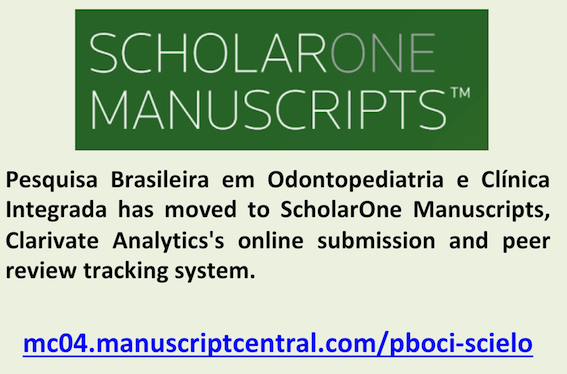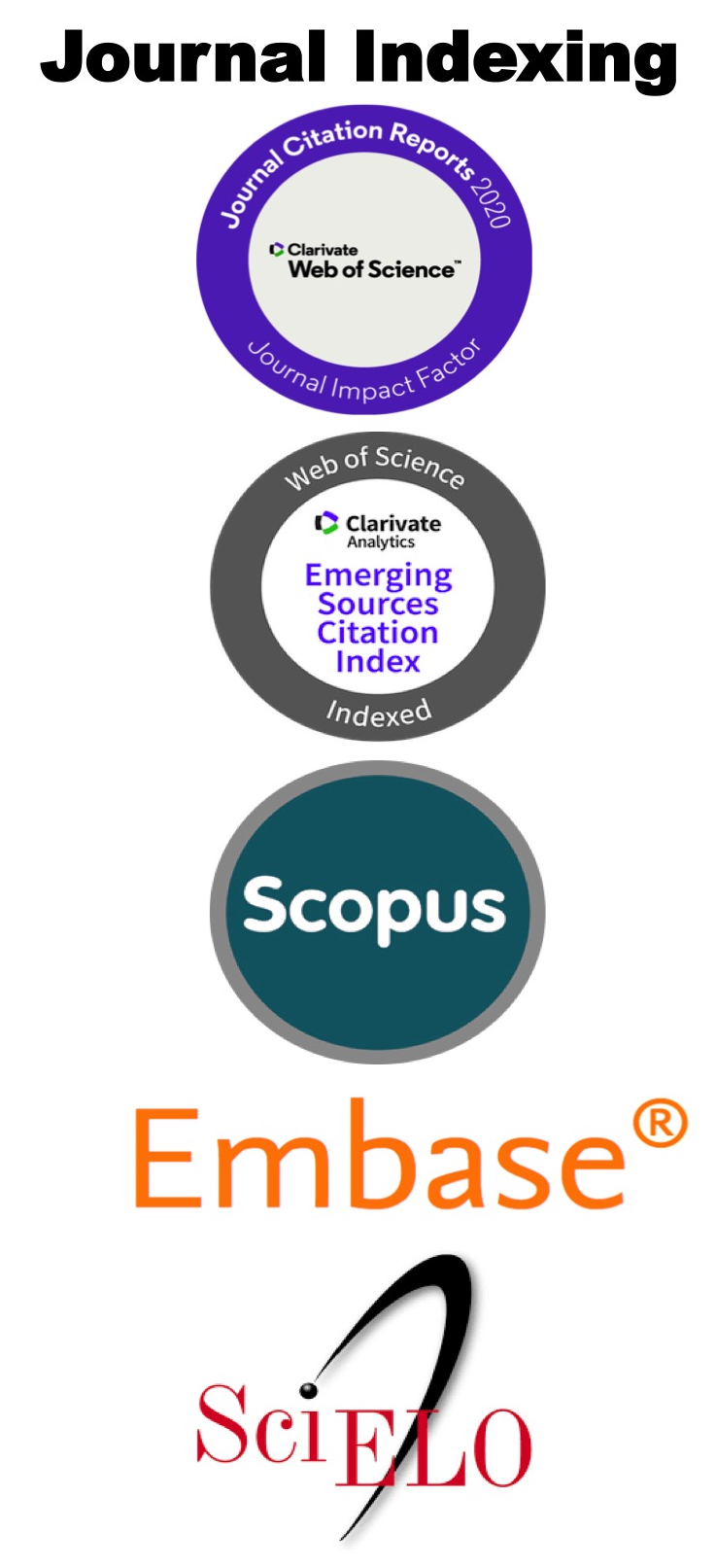Breastfeeding and Related Factors in Afrodescendant Women From Cartagena, Colombia
Keywords:
Feeding Behavior, Breast Feeding, Infant Health, Child HealthAbstract
Objective: To describe practices and related factors to breastfeeding in afrodescendant women from Cartagena de Indias city, Colombia. Material and Methods: Cross-sectional study conducted between 2016 and 2017 in 548 mothers who had under 5 years children from afrodescendant communities. A self-reported questionnaire was applied, asking for sociodemographic variables, breastfeeding time and exclusive breastfeeding, family support and factors related to this practice. Data were analyzed by descriptive statistics and risk estimation by Odds Ratio (OR). Results: Most mothers were young adults (89.8%), having high scholar level (55.2%), family support and they were associated to the public health system. The prevalence of breastfeeding and exclusive breastfeeding during the first 6 months was 91.6% and 80.4%, respectively. Breastfeeding and exclusive breastfeeding practice were associated with mother's age (OR = 3.24, 95% CI= 1.80-5.8) and low mother's educational level (OR = 3.24, 95% CI= 1.8-5.8). Finally, no breastfeeding and the fact of not being performed exclusively was associated with no mother nipples examination, and not or insufficient information supplied about this issue. Conclusion: Breastfeeding practice was associated with mother's age and her educational level as well as with poor preparation to start this practice. Although its prevalence was high, it is necessary to implement policies within health system to encourage its practice and provide measures to solve problems during their development in mothers from vulnerable communities.
References
Koletzko B, Brands B, Chourdakis M, Cramer S, Grote V, Hellmuth C, et al. The Power of Programming and the EarlyNutrition project: opportunities for health promotion by nutrition during the first thousand days of life and beyond. Ann Nutr Metab 2014; 64(3-4):87-96. https://doi.org/10.1159/000365017
Johnston M, Landers S, Noble L, Szucs K, Viehmann L. Breastfeeding and the use of human milk. Pediatrics 2012; 129(3):e827- 41. https://doi.org/10.1542/peds.2011-3552
Prell C, Koletzko B. Breastfeeding and complementary feeding: recommendations on infant nutrition. Dtsch Arztebl Int 2016; 113(25):435-44. https://doi.org/10.3238/arztebl.2016.0435
Ip S, Chung M, Raman G, Trikalinos TA, Lau J. A summary of the Agency for Healthcare Research and Quality's evidence report on breastfeeding in developed countries. Breastfeed Med 2009; 4(Suppl 1):S17-30. https://doi.org/10.1089/bfm.2009.0050
Gera T, Shah D, Garner P, Richardson M, Sachdev HS. Integrated management of childhood illness (IMCI) strategy for children under five. Cochrane Database Syst Rev 2016; (6): 1-61. https://doi.org/10.1002/14651858.CD010123.pub2
Kramer MS, Chalmers B, Hodnett ED, Sevkovskaya Z, Dzikovich I, Shapiro S, et al. Promotion of Breastfeeding Intervention Trial (PROBIT): a randomized trial in the Republic of Belarus. JAMA 2001; 285(4):413-20. https://doi.org/10.1001/jama.285.4.413
World Health Organization. Indicators for assessing infant and young child feeding practices: conclusions of a consensus. 2008 Washington DC: WHO.
Departamento Administrativo Nacional de Estadísticas. Available from: http://www.dane.gov.co/index.php/estadisticas-por tema/salud/nacimientos-y-defunciones. [Accessed on September 18, 2017].
Setegn T, Gerbaba M, Belachew T. Determinants of timely initiation of breastfeeding among mothers in Goba Woreda, South East Ethiopia: a cross sectional study. BMC Public Health 2011; 211-17. https://doi.org/10.1186/1471-2458-11-217
Bueno MB, Souza JM, Souza SB, Sampaio da Paz SM, Agostinho SG, Franco AA. Risks associated with the weaning process in children born in a university hospital: a prospective cohort in the first year of life, São Paulo, 1998-1999. Cad Saúde Pública 2003; 19(5):1453-60. https://doi.org/10.1590/S0102-311X2003000500024
Oribe M, Lertxundi A, Basterrechea M, Begiristain H, Santa Marina L, Villar M, et al. Prevalence of factors associated with the duration of exclusive breastfeeding during the first 6 months of life in the INMA birth cohort in Gipuzkoa. Gac Sanit 2015; 29(1):4-9. https://doi.org/10.1016/j.gaceta.2014.08.002
Rodríguez J, Acosta N. Factores asociados a la lactancia materna exclusiva en población pobre de áreas urbanas de Colombia. Rev Salud Pública 2008; 10(1): 71-84. [In Spanish].
Díaz CE, López R, Herrera I, Arena D, Giraldo C, Gonzáles L. Factors associated with breastfeeding in children less than one year of age in the city of Cartagena, Colombia. Colomb Med 2011; 42(2):26-34.
Acharya P, Khanal V. The effect of mother's educational status on early initiation of breastfeeding: further analysis of three consecutive Nepal Demographic and Health Surveys. BMC Public Health 2015; 15:1069. https://doi.org/10.1186/s12889-015-2405-y
Kimbro RT. On-the-job moms: work and breastfeeding initiation and duration for a sample of low-income women. Matern Child Health J 2006; 10(1):19-26. https://doi.org/10.1007/s10995-005-0058-7
Calnen G. Paid maternity leave and its impact on breastfeeding in the United States: an historic, economic, political, and social perspective. Breastfeed Med 2007; 2(1):34-44. https://doi.org/10.1089/bfm.2006.0023
Aidam BA, Pérez-Escamilla R, Lartey A. Lactation counseling increases exclusive breastfeeding rates in Ghana. J Nutr 2005; 135(7):1691-5. https://doi.org/10.1093/jn/135.7.1691
Mogre V, Dery M, Gaa PK. Knowledge, attitudes and determinants of exclusive breastfeeding practice among Ghanaian rural lactating mothers. Int Breastfeed J 2016; 11:12. https://doi.org/10.1186/s13006-016-0071-z
Onah S, Osuorah DC, Ebenebe J, Ezechukwu C, Ekwochi U, Ndukwu I. Infant feeding practices and maternal socio- demographic factors that influence practice of exclusive breastfeeding among mothers in Nnewi South-East Nigeria: a cross-sectional and analytical study. Int Breastfeed J 2014; 9:6. https://doi.org/10.1186/1746-4358-9-6
Onah HE, Ikeako LC, Iloabachie GC. Factors associated with the use of maternity services in Enugu, southeastern Nigeria. Soc Sci Med 2006; 63(7):1870-8. https://doi.org/10.1016/j.socscimed.2006.04.019
Fotso JC, Ezeh A, Madise N, Ziraba A, Ogollah R. What does access to maternal care mean among the urban poor? Factors associated with use of appropriate maternal health services in the slum settlements of Nairobi, Kenya. Matern Child Health J 2009; 13(1):130-7. https://doi.org/10.1007/s10995-008-0326-4
Ingram J, Johnson D. A feasibility study of an intervention to enhance family support for breast feeding in a deprived area in Bristol, UK. Midwifery 2004; 20(4):367-79. https://doi.org/10.1016/j.midw.2004.04.003
Bergman M, Nygren-Brunell O, Vilakati D, Målqvist M. Prolonged exclusive breastfeeding through peer support: a cohort study from a community outreach project in Swaziland. J Community Health 2016; 41(5):932-8. https://doi.org/10.1007/s10900-016-0173-y
Persad MD, Mensinger JL. Maternal breastfeeding attitudes: association with breastfeeding intent and socio- demographics among urban primiparas. J Community Health 2008; 33(2):53-60. https://doi.org/10.1007/s10900-007-9068-2
Bich TH, Cuong NM. Changes in knowledge, attitude and involvement of fathers in supporting exclusive breastfeeding: a community-based intervention study in a rural area of Vietnam. Int J Public Health 2017; 62(Suppl1):17-26. https://doi.org/10.1007/s00038-016-0882-0
Rempel LA, Rempel JK, Moore KC. Relationships between types of father breastfeeding support and breastfeeding outcomes. Matern Child Nutr 2017; 13(3):1-14. https://doi.org/10.1111/mcn.12337
Smith PH, Coley SL, Labbok MH, Cupito S, Nwokah E. Early breastfeeding experiences of adolescent mothers: a qualitative prospective study. Int Breastfeed J 2012; 7(1):13. https://doi.org/10.1186/1746-4358-7-13
Swanson V, Power K, Kaur B, Carter H, Shepherd K. The impact of knowledge and social influences on adolescents' breast-feeding beliefs and intentions. Public Health Nutr 2006; 9(3):297-305. https://doi.org/10.1079/phn2006845
Dias de Oliveira L, Justo Giugliani ER, Córdova do Espírito Santo L, Meirelles Nunes L. Counselling sessions increased duration of exclusive breastfeeding: a randomized clinical trial with adolescent mothers and grandmothers. Nutr J 2014; 17:73. https://doi.org/10.1186/1475-2891-13-73
Dehlendorf C, Marchi K, Vittinghoff E, Braveman P. Sociocultural determinants of teenage childbearing among Latinas in California. Matern Child Health J 2010; 14(2):194-201. https://doi.org/10.1007/s10995-009-0443-8
Machado MM, Assis KF, Oliveira FC, Ribeiro AQ, Araújo RA, Cury AF, et al. Determinants of the exclusive breastfeeding abandonment: psychosocial factors. Rev Saude Publica 2014; 48(6):985-94. https://doi.org/10.1590/S0034-8910.2014048005340
Tayebi T, Zahrani ST, Mohammadpour R. Relationship between adequacy of prenatal care utilization index and pregnancy outcomes. Iran J Nurs Midwifery Res 2013; 18(5):360-66.
Yngve A, Sjöström M. Breastfeeding determinants and a suggested framework for action in Europe. Public Health Nutr 2001; 4(2):729-39. https://doi.org/10.1079/phn2001164
Braun MG, Giugliani EJ, Soares MM, Giugliani C, de Oliveira AP, Danelon C M. Evaluation of the impact of the Baby-Friendly Hospital initiative on rates of breastfeeding. Am J Public Health 2003; 93(8):1277-79. https://doi.org/10.2105/ajph.93.8.1277
Carai S, Kuttumuratova A, Boderscova L, Khachatryan H, Lejnev I, Monolbaev K, et al. Review of integrated management of childhood illness (IMCI) in 16 countries in Central Asia and Europe: implications for primary healthcare in the era of universal health coverage. Arch Dis Child 2019; 104(12):1143-9. https://doi.org/10.1136/archdischild-2019-317072
Lamberti LM, Fischer CL, Noiman A, Victoria C, Black RE. Breastfeeding and the risk for diarrhea morbidity and mortality. BMC Public Health 2011; 11(Suppl 3):S15. https://doi.org/10.1186/1471-2458-11-S3-S15
Boskabadi H, Ramazanzadeh M, Zakerihamidi M, Rezagholizade OF. Risk factors of breast problems in mothers and its effects on newborns. Iran Red Crescent Med J 2014; 16(6):e8582. https://doi.org/10.5812/ircmj.8582
Kent JC, Ashton E, Hardwick CM, Rowan MK, Chia ES, Fairclough KA, et al. Nipple pain in breastfeeding mothers: incidence, causes and treatments. Int J Environ Res Public Health 2015; 12(10):12247-63. https://doi.org/10.3390/ijerph121012247
Dennis CL, Jackson K, Watson J. Interventions for treating painful nipples among breastfeeding women. Cochrane Database Syst Rev 2014; (12):CD007366. https://doi.org/10.1002/14651858.CD007366.pub2
World Health Organization. Learning from large-scale community-based programmes improve breastfeeding practices. Geneve: WHO, 2008.
Downloads
Published
How to Cite
Issue
Section
License
Copyright (c) 2020 Pesquisa Brasileira em Odontopediatria e Clínica Integrada

This work is licensed under a Creative Commons Attribution-NonCommercial 4.0 International License.



